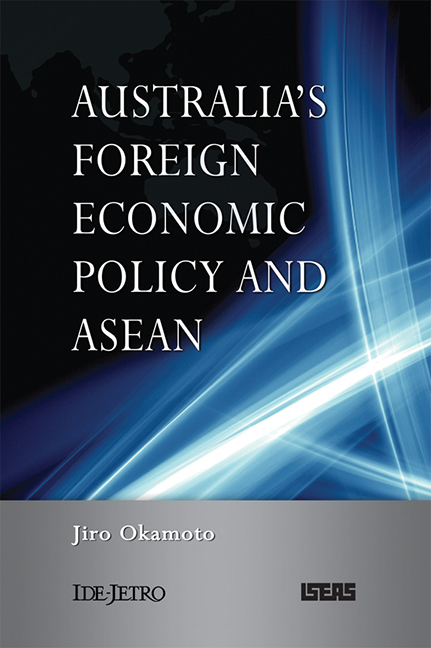Book contents
- Frontmatter
- Contents
- List of Figures and Tables
- Abbreviations and Acronyms
- Acknowledgements
- 1 Introduction
- 2 An Analytical Framework
- 3 State-Society Coalitions and Australia's Foreign Economic Policy
- 4 Australia and the Formation of ASEAN
- 5 The Trade Liberalizers and Asia-Pacific Regionalist Strategies
- 6 The Development of ASEAN Regionalism and the AFTA–CER Linkage Dialogue
- 7 The Bilateralists and their ASEAN Policy
- 8 Conclusion
- Appendix: Foreign Economic Policy-Related Ministers in Australia since 1941
- References
- Index
- About the Author
3 - State-Society Coalitions and Australia's Foreign Economic Policy
Published online by Cambridge University Press: 21 October 2015
- Frontmatter
- Contents
- List of Figures and Tables
- Abbreviations and Acronyms
- Acknowledgements
- 1 Introduction
- 2 An Analytical Framework
- 3 State-Society Coalitions and Australia's Foreign Economic Policy
- 4 Australia and the Formation of ASEAN
- 5 The Trade Liberalizers and Asia-Pacific Regionalist Strategies
- 6 The Development of ASEAN Regionalism and the AFTA–CER Linkage Dialogue
- 7 The Bilateralists and their ASEAN Policy
- 8 Conclusion
- Appendix: Foreign Economic Policy-Related Ministers in Australia since 1941
- References
- Index
- About the Author
Summary
Since the early 1980s, Australia's foreign economic policy has undergone two distinct shifts. The first, in the 1980s, was a consequence of the decision to reform the domestic economy. At that time, the government actively promoted multilateral trade and investment liberalization to underpin domestic reform. The second, commencing at the turn of the century, elevated bilateral relations over multilateral processes, in the context of a domestic economic regime that had already undergone significant liberalization. These shifts in Australia's foreign economic policy imply changes in dominant state-society coalitions.
This chapter provides an overall view of the rise and fall of a dominant state-society coalition in Australia and how it affected the direction of Australia's foreign economic policy. It addresses three broad questions: What coalitions with what policy ideas dominated Australian policy-making? How were these policy ideas reflected in actual foreign economic policy? Why (and when) was one dominant coalition replaced by another? This overview will help explain the shift in Australia's ASEAN policy, a matter which will be discussed in subsequent chapters.
THE PROTECTIONIST TRADITION
Origins
a) The Federation and “Domestic Defence”
The formation of the foundation state-society coalition in Australia's foreign economic policy-making inevitably reflected how the state was formed: at the beginning of the twentieth century, the six colonies of the British Empire (New South Wales, Queensland, South Australia, Tasmania, Victoria and Western Australia) in a remote continent at the south-western edge of the Pacific, together became a “sovereign” country, effectively forming a customs union. With federation in 1901, the politics of “domestic defence” emerged as an exercise in nation building (Castles 1988, p. 91). Domestic defence naturally meant the maintenance and promotion of national security but it also meant the protection of domestic economic activities. Already by that time, Australia as a whole had achieved one of the highest standards of living in the world.1 “The nation was founded not in war, revolution or national assertion, but by practical men striving for income, justice, employment and security” (Kelly 1992, p. 1). It was natural then that the protection of people' everyday lives became a government priority.
- Type
- Chapter
- Information
- Australia's Foreign Economic Policy and ASEAN , pp. 34 - 95Publisher: ISEAS–Yusof Ishak InstitutePrint publication year: 2010



